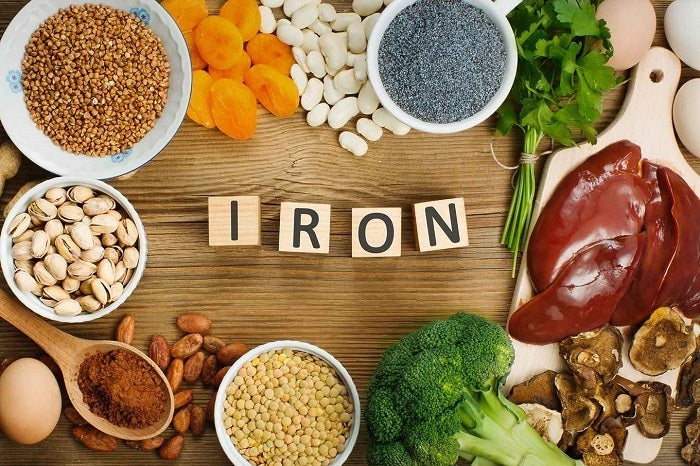We all know how important iron is to our children's diet. But did you know that there is more than one type of iron? And did you know that your child may not be getting enough of either?
All iron is not created equally, and if your child suffers from an iron-disorder or imbalance, it is important to know which types of iron can better benefit their health.
So here’s the deal with iron:
There are two forms of dietary iron, Heme iron and Non-heme iron.
Heme iron is only found in animal products or animal-based iron supplements. Red meat, poultry, seafood and fish all contain different amounts of Heme iron with red meat having the highest levels.
Non-heme iron is found in plant-based foods including beans, grains, vegetables, fruits, nuts and seeds.

In reality, a well-rounded, nutritious diet will most likely contain both Heme and Non-heme iron. Your child’s body recognizes the difference between the two iron sources and will absorb each type differently.
What’s up with Heme-iron?
Heme-iron is found predominantly in the blood and muscle, and is absorbed better by the body than Non-heme iron.
The good thing about Heme-iron is that your child’s body will absorb about 15% to 35% of what is consumed. This means you can eat less meat to gain more iron.
The bad thing about getting too much Heme-iron is that it can increase the risk of cancer, stroke, heart disease and metabolic issues in both children and adults. Yikes.
What’s up with Non-heme iron?
Non-heme iron is found in plant foods like leafy greens, beans, wheat and nuts. This type of iron is absorbed at a slower pace than Heme-iron, allowing your body to moderate it better.
The good thing about Non-heme iron is that it poses a lower risk of causing iron toxicity, even when consumed in large amounts.
The bad thing about Non-heme iron is that only 2%-20% of Non-heme iron is absorbed by the body, which means you would need to eat a lot more greens to gain more iron. For those parents of picky-eaters, that can be a huge challenge.
Which type of iron is actually better for my kid?

Iron is absolutely an essential mineral for kids, and keeping the right balance of iron types is critical. Although Heme-iron is absorbed faster by the body, rapid absorption of iron isn’t always a good thing and can be toxic. On the same note, absorbing too little iron put kids at risk for developing iron deficiency anemia and can also increase stress in children.
So what is a parent to do?
While these concerns can exist with both types of iron, the additional health concerns linked directly to Heme-iron, such as stroke, cancer, and heart disease make Non-heme iron a better choice. Your child’s body is simply better at moderating the absorption of Non-heme iron.
The low absorption rate of Non-heme iron is considered a weakness, but it is actually a strength in disguise! This is because Non-heme iron is not attached to a protein, therefore your child’s body allows it pass through the digestive system for elimination.
Heme-iron, on the other hand, can bypass the body’s attempts to control iron absorption because your child’s body has no way of eliminating the excess iron from the body.
Even when consumed in large amounts, Non-heme iron poses a much lower risk of causing iron toxicity and other health concerns that come from consuming too much meat. For most parents, this is a significant advantage!
The type of diet you choose to feed your kids is up to you. Fortunately, there are many delicious foods and healthy nutrients that can be combined to help reduce or increase iron absorption in your child’s meals. Whether you are vegetarian, vegan or paleo you can find the right iron-fortified diet for your family!


